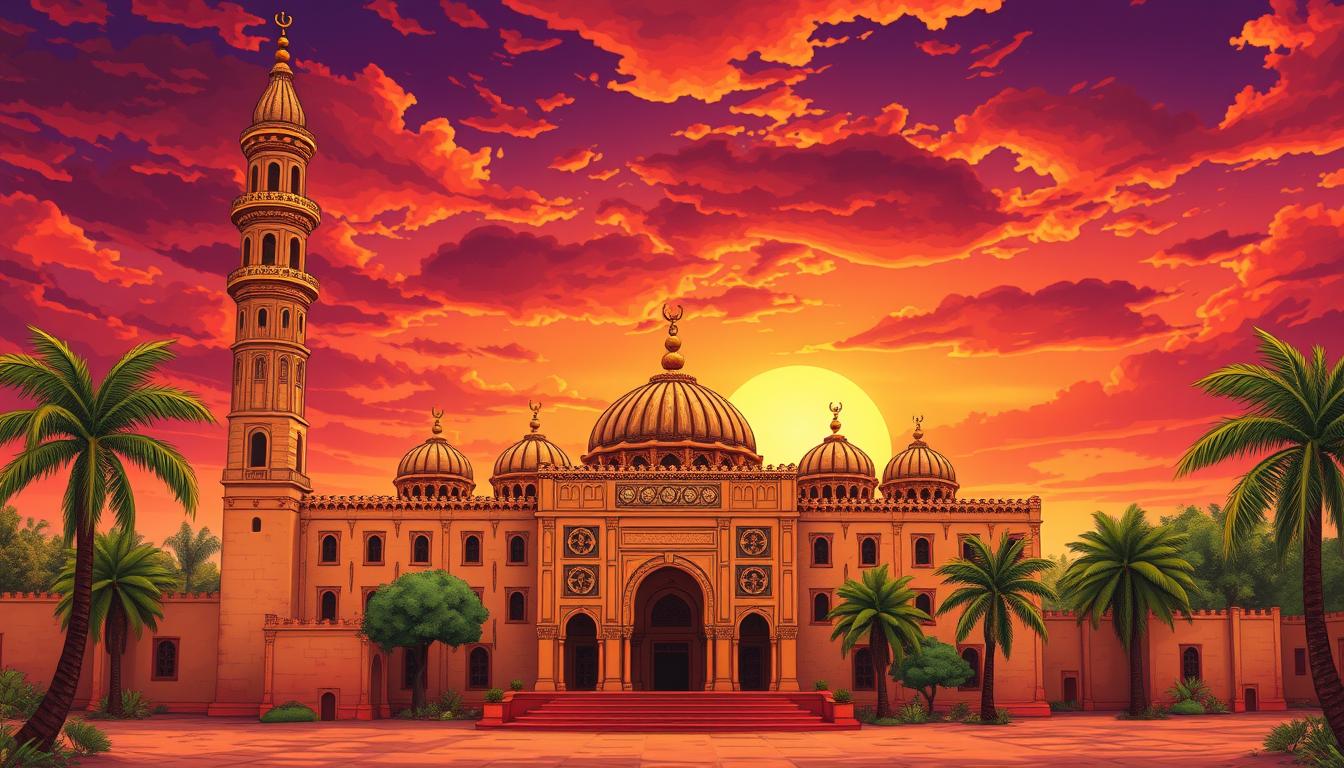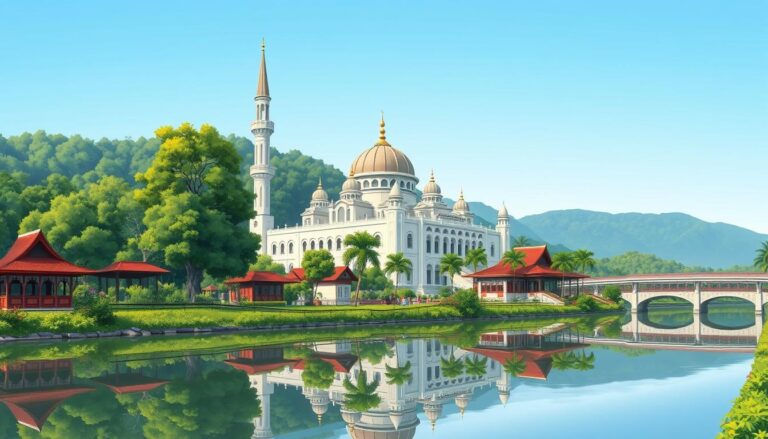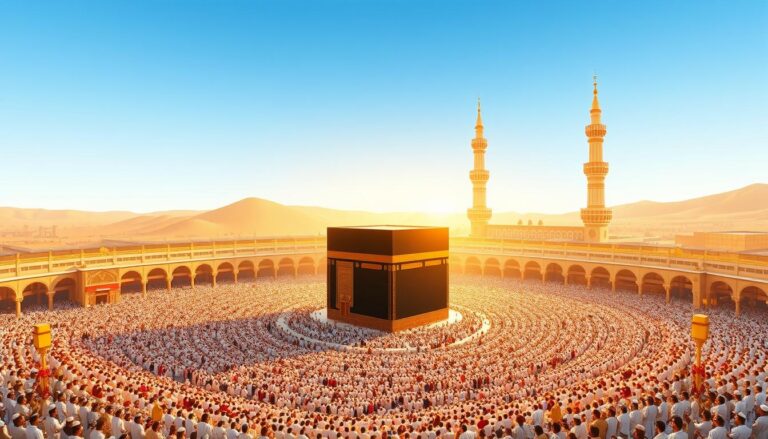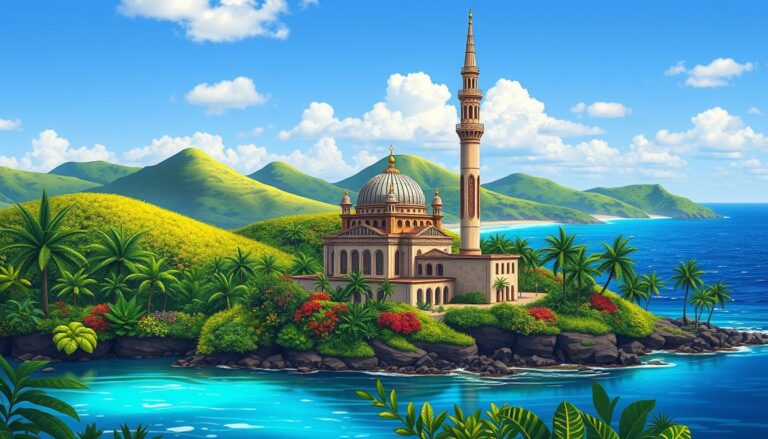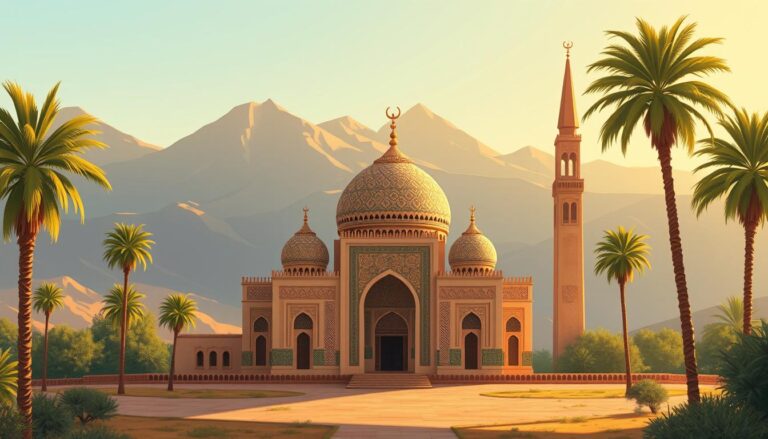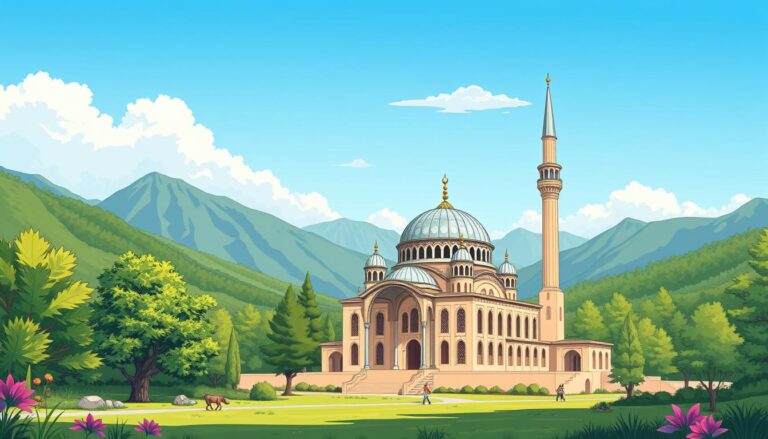Islam in Burkina Faso
In 2019, 63.8% of Burkina Faso’s people were Muslim. Most followed Sunni Islam, specifically the Maliki school. Islam has been in Burkina Faso since the 15th century. Back then, Muslim merchants and settlements started to appear.
The Mossi Kingdoms first fought against Islamic influences. But, Muslim traders, scholars, and communities slowly became part of Burkinabe life. French rule in the 19th and 20th centuries helped Islam spread even more. The Muslim population grew from 30,000 to over 800,000 by 1959.
Introduction to Islam in Burkina Faso
Islam is the main religion in Burkina Faso, with 63.8% of people following it, as shown in the 2019 census. Most of these Muslims are Sunni, following the Maliki school. But, there are also Shia and Ahmadiyya Muslims in smaller numbers.
Overview of the Muslim Population
The number of Muslims in Burkina Faso has grown a lot. In 2006, 60.5% were Muslims, and by 2019, it was 63.8%. Christians make up 26.3% of the population, while 9% follow Animism/Folk Religion. The census also found that 0.9% of people were unaffiliated or followed other faiths.
Significance of Islam in Burkinabe Society
Islam has deeply influenced Burkinabe society. It has shaped the country’s culture, traditions, and social structures. Muslim traders, scholars, and communities have been part of the local Mossi kingdoms for centuries.
This has led to the blending of Islamic and traditional African beliefs and practices. Islam’s impact is seen in many parts of Burkinabe life, from architecture and festivals to education and governance.
“The Islam Burkina Faso Collection contains over 2,900 archival documents, newspaper articles, Islamic publications, photographs, and audio recordings on Islam and Muslims in Burkina Faso since 1960.”
Historical Roots of Islam in Burkina Faso
Islam came to Burkina Faso, then Upper Volta, in the 15th century. It was brought by Muslim merchants from places like Timbuktu and Hausa city-states. These traders settled in towns like Bobo-Dyulasso and Kong, starting communities and trading goods.
Arrival and Spread of Islam
The children of these traders and local women helped convert the Mossi people to Islam. The Dyula communities were known for their high Muslim education. Students learned the Quran and more under respected teachers.
These Dyula scholars, or karamokos, started schools in villages. They spread Islamic learning and practices far and wide.
Role of Muslim Traders and Scholars
Muslim traders and scholars played a big role in spreading Islam in Burkina Faso. The French colonial rule also helped by bringing stability and economic growth. This helped Islam in Burkina Faso grow and thrive over time.
“The history of Islam in West Africa can be explained in three stages: containment, mixing, and reform.”
The spread of Islam in Burkina Faso was helped by the region’s key trade routes. Also, the hard work of Muslim scholars in Burkina Faso was crucial in spreading the faith.
Major Branches and Practices
Burkina Faso is mostly Muslim, with most people following Sunni Islam. The Maliki school is the most popular in the country.
The Maliki school values consensus and practicality. It’s deeply rooted in Burkina Faso’s Islamic practices. Sufism also plays a big role, with many Muslims belonging to the Tijaniyah Sufi order.
Sunni Islam and the Maliki School
Sunni Islam is the main form of Islam in Burkina Faso. The Maliki school is very influential here. It focuses on finding common ground and practical solutions.
The Sunni-Maliki tradition is shaped by Sufism. Many Burkinabe Muslims are part of the Tijaniyah Sufi order. This has greatly influenced the country’s Islamic culture.
“The Maliki school of thought, which emphasizes consensus and pragmatism, has become deeply embedded in Burkinabe Islamic practices and traditions.”
Islam in Burkina Faso
Influence of Sufism and Sufi Orders
Sufism, the mystical branch of Islam, has greatly influenced Burkina Faso’s religious scene. Many Sunni Muslims in the country are part of the Tijaniyah Sufi order. This order focuses on spiritual practices like honoring saints and using talismans.
It also organizes spiritual festivals. Sufi scholars and orders have been key in spreading and strengthening Islam in Burkina Faso for centuries.
Shia and Ahmadiyya Minorities
While most Muslims in Burkina Faso are Sunni, there are Shia and Ahmadiyya minorities. The Pew Research Center says less than 1% of Burkinabe Muslims are Shia. The Ahmadiyya community also exists in the country, but their numbers are not clear.
“Sufi practices, such as the veneration of saints, the use of talismans, and the organization of spiritual festivals, have become integral to the religious and cultural landscape of Burkina Faso.”
Geographic Distribution of Muslims
Burkina Faso, a West African nation, has a diverse religious scene. About 60% of its people are Sunni Muslims. Most Muslims live in the northern, eastern, and western parts of the country.
Christians mainly live in the central area of Burkina Faso. Traditional and animist beliefs are common in rural areas.
In Ouagadougou, the capital, you’ll find both Muslims and Christians. Bobo-Dioulasso, the second-largest city, is mostly Muslim. The Fulani and Dioula, two big ethnic groups, are mostly Muslim too.
The 2019 census showed Islam is the main religion, with 63.8% of the population. Christians make up 26.3%, and indigenous beliefs are practiced by 9%. Only 0.9% follow other religions or have no faith.
The way religions are spread out in Burkina Faso shows the country’s rich culture. Knowing this helps keep religious peace and supports unity among different faiths.
Ethnic Diversity and Islam
Burkina Faso is a nation rich in cultural and ethnic diversity. It is home to over 60 distinct ethnic groups. Among these, the Fulani people have greatly influenced the country’s Islamic traditions and practices.
The Fulani Community and Muslim Traditions
The Fulani, a nomadic pastoral group, are almost exclusively Muslim. They have played a key role in spreading and preserving Islamic faith in Burkina Faso. They have blended their unique cultural heritage with Islamic teachings.
The Fulani’s deep respect for Islamic teachings is crucial. They actively participate in religious activities. This keeps Islam strong in the country. They observe daily prayers, religious festivals, and uphold Islamic values.
“The Fulani people have a long-standing tradition of embracing and promoting Islamic teachings, making them a vital component of the country’s religious landscape.”
Despite Burkina Faso’s ethnic diversity, the Fulani community’s commitment to Islam unites them. This fosters cultural and religious harmony across the nation.
Religious Tolerance and Interfaith Harmony
Burkina Faso is known for its religious tolerance and interfaith harmony. The largest religious groups share this value. They include the Burkinabe Muslim Community Organization, the Catholic Archdiocese of Ouagadougou, and the Federation of Evangelical Churches.
Families of different faiths often celebrate together. Religious leaders also join in, showing the country’s tradition of peace.
Coexistence with Other Faiths
Burkina Faso is a diverse place, with about 61% Muslims, 23% Christians, and 15% indigenous believers. Religious tolerance and interfaith harmony are key to its society. Different faiths live together peacefully.
Role of Religious Leaders in Promoting Peace
When Burkina Faso faced two military coups in 2022, religious leaders were crucial. They worked to stop violence and bring peace. Leaders from all faiths talked and tried to calm things down.
They used their influence to help the country stay united. This was important as the security situation got worse.
“Religious leaders in Burkina Faso have been instrumental in promoting peace and preventing further violence during these turbulent times. Their efforts to bridge divides and foster understanding have been vital for the country’s stability.”
Contemporary Challenges
Burkina Faso has always been known for its religious tolerance. But lately, extremism and religious violence have become big threats. Groups like Ansaroul Islam and Islamic State in Greater Sahara have attacked places of worship and religious leaders. These attacks have hurt the country’s social fabric and religious harmony.
Recent data shows that violence in Burkina Faso has killed nearly 7,600 people in 2023. Over 2 million people have lost their homes since 2016. Islamist groups have taken over 25 towns, affecting 800,000 people and causing food shortages.
The Burkinabè military is trying to fight back by training 50,000 local militias. But, these forces have also been accused of killing civilians. In one tragic event, the military killed at least 156 civilians, including women and children, in Karma village.
The rise in extremism in Burkina Faso and religious violence in Burkina Faso has made the country less secure. The number of deaths from militant violence has nearly tripled since January 2022. Experts predict that 2023 will see a 137% increase in deaths, with 8,600 people expected to be killed.
“The situation in Burkina Faso has become increasingly dire, with extremist groups expanding their control and conducting horrific acts of violence that are tearing apart the social fabric of the country.”
Cultural Expressions of Islam
The Islamic faith has deeply influenced Burkina Faso’s culture. The country’s mosques stand out with their stunning architecture. The Muslim calendar’s celebrations add to the vibrant culture of Burkina Faso.
Architecture and Mosques
The Islamic architecture in Burkina Faso showcases the region’s rich heritage. The Grand Mosque in Bobo-Dioulasso is a beautiful example. It combines local materials with Islamic design.
Mosques are more than places of worship. They are community centers and hubs for Islamic learning.
Islamic Festivals and Celebrations
The Muslim community in Burkina Faso celebrates many Islamic festivals and celebrations. Events like Eid al-Fitr, Eid al-Adha, and the Prophet Muhammad’s birthday are joyous. They bring people together, creating a sense of unity.
“The inclusive school initiated by the Daughters of Charity in the Nouna Diocese in 2017 started with 68 students and has grown to accommodate 3,014 students by 2022. Out of the total student population, 70 children have special needs such as autism, Down syndrome, physical handicaps, and hearing impairment.”
Conclusion
Islam has played a big role in Burkina Faso’s history and culture for centuries. It has shaped the country’s social, political, and religious scenes. Despite facing challenges like extremism and violence, the country values religious tolerance and harmony.
The Muslim population in Burkina Faso is growing. This means Islam’s influence will likely shape the country’s identity even more. This presents both chances and hurdles for the diverse communities living there.
The study found that Burkina Faso’s crisis is more than just about security. It’s about local and social issues too. People want class equality and question the power of traditional leaders and religion.
This shift has made Muslims in Burkina Faso feel left out. They feel they don’t have a say in important decisions. This has caused frustration among them.
The research on political Islam in Burkina Faso shows both its challenges and benefits. It aims to promote fair governance. The study used a lot of research and talked to many people to get its insights.
However, the study mainly looked at Western views on political Islam. This might miss out on other important perspectives. It shows we need a deeper understanding of this complex topic.
Source Links
- Islam in Burkina Faso
- Burkina Faso – United States Department of State
- Religion in Burkina Faso
- Review: Islam Burkina Faso Collection
- The Spread of Islam in West Africa: Containment, Mixing, and Reform from
- No title found
- National Profiles | World Religion
- Burkina Faso – Christian Aid Mission
- Burkina Faso: Islamist Armed Groups Terrorize Civilians
- Burkina Faso – United States Department of State
- Religion and violence in Burkina Faso
- Burkina Faso – United States Department of State
- Legislation Factsheet: Attacks on Houses of Worship and Religious Leaders in Burkina Faso
- Burkina Faso – United States Department of State
- World Report 2024: Rights Trends in Burkina Faso
- Burkina Faso Crisis Continues to Spiral – Africa Center
- In Burkina Faso, Muslims and Christians show how to live as one
- Burkina Faso: ‘We’re raising our daughter as both Christian and Muslim’
- Thesis_SG
- Conclusion

